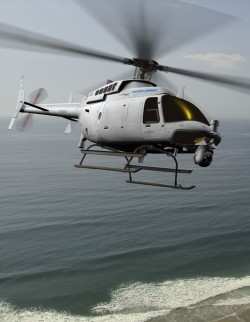Mon, May 10, 2010
Fire-X Increases Payload, Range On Fire Scout Platform
 U.S. war fighters will be able to keep tabs on their enemies
for longer periods of time, communicate more easily with their
commanders, and deliver more cargo to more remote locations using
the new Fire-X medium-range vertical unmanned aerial system (VUAS)
unveiled Wednesday by Northrop Grumman and Bell
Helicopter.
U.S. war fighters will be able to keep tabs on their enemies
for longer periods of time, communicate more easily with their
commanders, and deliver more cargo to more remote locations using
the new Fire-X medium-range vertical unmanned aerial system (VUAS)
unveiled Wednesday by Northrop Grumman and Bell
Helicopter.
The two companies have partnered to develop and demonstrate the
new rugged, high-capacity unmanned aerial system based on the
four-blade, single-engine Bell 407 helicopter. First flight of
Fire-X is expected by the end of 2010. The new system also
represents Northrop Grumman's entry in an anticipated U.S. Navy
competition in 2011 to demonstrate a new medium-range UAS.
"The Fire-X system integrates Northrop Grumman's proven unmanned
systems know-how with a proven, FAA-certified helicopter airframe
that's been in service since 1996," said Gene Fraser, sector vice
president and general manager for the Advanced Programs and
Technology division of Northrop Grumman's Aerospace Systems sector.
"The result will be an affordable, fast-fielding system that
delivers the maturity of the unmanned systems architecture
developed by the U.S. Navy's MQ-8B Fire Scout program, while giving
military services the extra UAS cargo, payload and endurance they
seek."
 Reporters got their first look at the new VUAS concept in
Northrop Grumman's booth at the Navy League Sea-Air-Space
Exposition in National Harbor, MD. "Bell Helicopter brings to the
Fire-X development more than 50 years of experience producing and
supporting U.S. military helicopters across the full rotary-wing
aviation mission spectrum, including armed reconnaissance, attack,
utility, and MedEvac," said Jeff Lowinger, executive vice president
of engineering for Bell Helicopter. "We're also backing this new
offering with Bell's unmatched global logistics support, training,
and industry-leading customer service."
Reporters got their first look at the new VUAS concept in
Northrop Grumman's booth at the Navy League Sea-Air-Space
Exposition in National Harbor, MD. "Bell Helicopter brings to the
Fire-X development more than 50 years of experience producing and
supporting U.S. military helicopters across the full rotary-wing
aviation mission spectrum, including armed reconnaissance, attack,
utility, and MedEvac," said Jeff Lowinger, executive vice president
of engineering for Bell Helicopter. "We're also backing this new
offering with Bell's unmatched global logistics support, training,
and industry-leading customer service."
 Fire-X will incorporate Fire Scout's modular, field-proven
architecture that accommodates a variety of intelligence,
surveillance and reconnaissance (ISR) and communications payloads.
It also provides complementary capabilities for missions that
demand larger payloads (up to 3000 pounds), longer endurance (more
than 14 hours) and robust cargo hauling (up to 2646 pounds
external).
Fire-X will incorporate Fire Scout's modular, field-proven
architecture that accommodates a variety of intelligence,
surveillance and reconnaissance (ISR) and communications payloads.
It also provides complementary capabilities for missions that
demand larger payloads (up to 3000 pounds), longer endurance (more
than 14 hours) and robust cargo hauling (up to 2646 pounds
external).
The aircraft is being designed to operate with nearly any type of
current or future military standards-based control segment. It will
communicate as easily with shipboard controllers using the Navy's
Tactical Control Station (TCS) as field commanders using the U.S.
Army's field-proven One System® ground control station. It also
takes full advantage of Northrop Grumman's proven ability to
"unman" or optionally man a manned helicopter – i.e. replace
the in-vehicle pilot with the appropriate avionics, software and
ground control station to accurately and reliably duplicate the
behavior and performance of the air vehicle.
More News
Terminal Radar Service Area Airspace surrounding designated airports wherein ATC provides radar vectoring, sequencing, and separation on a full-time basis for all IFR and participa>[...]
Very High Frequency (VHF) The frequency band between 30 and 300 MHz. Portions of this band, 108 to 118 MHz, are used for certain NAVAIDs; 118 to 136 MHz are used for civil air/grou>[...]
“From approximately November 2021 through January 2022, Britton-Harr, acting on behalf of AeroVanti, entered into lease-purchase agreements for five Piaggio-manufactured airc>[...]
Also: Virtual FLRAA Prototype, IFR-Capable Autonomous A/C, NS-32 Crew, Golden Dome Missile Defense Bombardier announced that the first production Global 8000 successfully completed>[...]
Aero Linx: The 1-26 Association (Schweizer) The Association’s goal is to foster the helpfulness, the camaraderie, and the opportunity for head-to-head competition that is fou>[...]
 ANN's Daily Aero-Term (05.29.25): Terminal Radar Service Area
ANN's Daily Aero-Term (05.29.25): Terminal Radar Service Area ANN's Daily Aero-Term (05.30.25): Very High Frequency (VHF)
ANN's Daily Aero-Term (05.30.25): Very High Frequency (VHF) Aero-News: Quote of the Day (05.30.25)
Aero-News: Quote of the Day (05.30.25) Airborne 05.23.25: Global 8000, Qatar B747 Accepted, Aviation Merit Badge
Airborne 05.23.25: Global 8000, Qatar B747 Accepted, Aviation Merit Badge ANN's Daily Aero-Linx (05.30.25)
ANN's Daily Aero-Linx (05.30.25)





